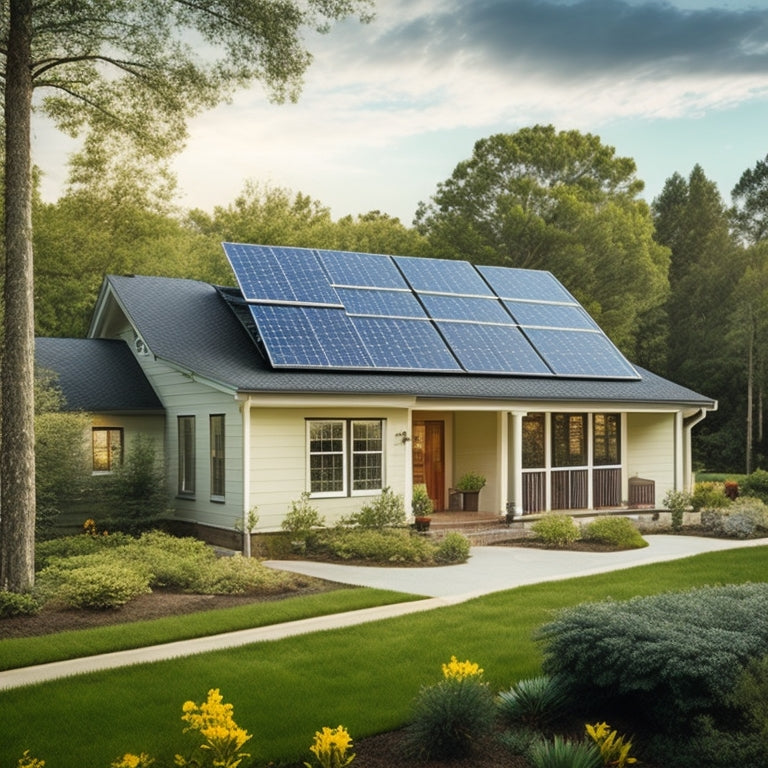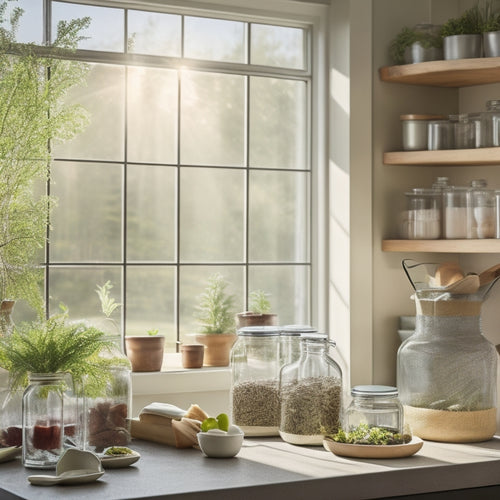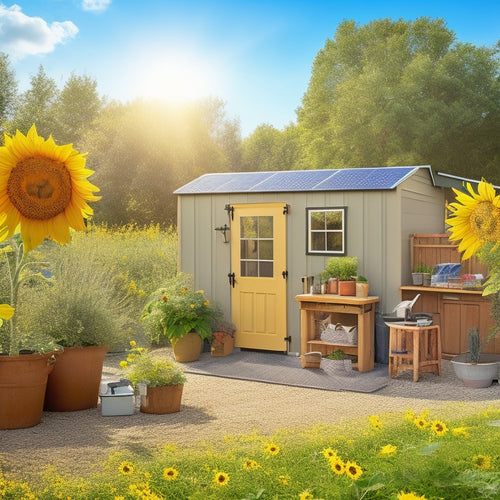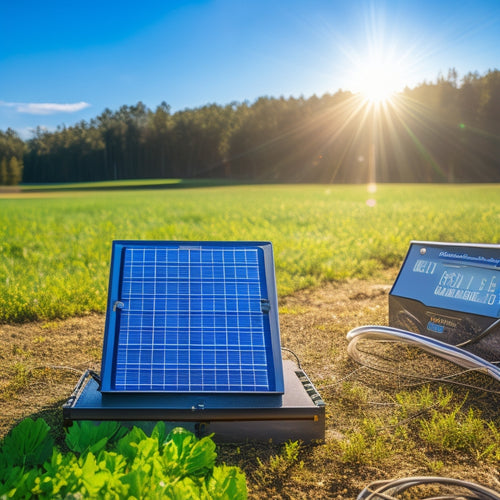
5 Tips for Small Home Solar Systems
Share
When installing a small home solar system, you'll want to assess your energy needs by analyzing consumption patterns and reviewing past utility bills to identify peak usage periods. Choose the right equipment by researching solar panel types and inverter options, and guarantee they meet safety standards and certifications. Maximize roof space efficiency by evaluating solar panel orientation and pitch, and apply south-facing orientation for ideal energy production. Balance cost and quality by researching prices and investigating financing options, and prioritize certifications and warranty support. By following these tips, you'll be well on your way to a successful shift to renewable energy, and there's even more to investigate to get the most out of your system.
Key Takeaways
- Assess your energy needs by analyzing consumption patterns, reviewing utility bills, and conducting an energy audit to ensure the solar system is properly sized.
- Choose the right equipment by researching solar panel types, inverter options, and mounting hardware, and verifying safety standards and certifications.
- Maximize roof space efficiency by evaluating panel orientation, roof pitch, and tilt angles to optimize energy production and minimize shading.
- Balance cost and quality by comparing prices, exploring financing options, and looking for certifications and warranties from manufacturers and installers.
- Monitor and maintain performance by implementing tracking systems, conducting routine inspections, and cleaning solar panels to ensure optimal energy production.
Assessing Your Energy Needs
Determine how much energy your home consumes to accurately size your small home solar system.
You'll need to analyze your energy consumption patterns, including seasonal variations. Review your past utility bills to identify peak usage periods, such as summer afternoons when air conditioning is in high demand.
Consider factors like the number of occupants, appliances, and lighting fixtures in your home. You may also want to conduct an energy audit to identify areas of inefficiency.
By understanding your energy needs, you can verify your solar system is properly sized to meet your requirements, providing a safe and reliable source of power.
Accurate sizing will also help you achieve maximum energy savings and reduce your carbon footprint.
Choosing the Right Equipment
You'll need to select high-quality equipment that meets your energy needs and budget when choosing the right components for your small home solar system. This includes solar panels, inverters, and mounting hardware.
-
Research different solar panel types, such as monocrystalline, polycrystalline, and thin-film, to determine which is best for your climate and energy requirements.
-
Investigate inverter options, including string inverters, microinverters, and power optimizers, to guarantee efficient energy conversion.
-
Consider the durability and weather resistance of mounting hardware, such as racking and tracking systems.
-
Look for equipment that meets safety standards and certifications, such as UL and IEC.
-
Evaluate the warranty and customer support offered by manufacturers and installers.
Maximizing Roof Space Efficiency
Optimizing your roof's real estate is essential to maximize energy production from your small home solar system. You need to evaluate solar panel orientation and roof pitch considerations to get the most out of your system.
| Roof Pitch | Optimal Solar Panel Orientation |
|---|---|
| Flat to 10° | South-facing, tilted 10-15° |
| 10-30° | South-facing, tilted 20-30° |
| 30-45° | South-facing, tilted 30-40° |
Balancing Cost and Quality
When evaluating the pros and cons of small home solar systems, finding the sweet spot between cost and quality becomes a delicate balancing act.
You need to confirm that your system is reliable, efficient, and safe, while also fitting within your budget.
-
Research and compare prices from different manufacturers and installation services to find the best value for your money.
-
Consider financing options that can help spread the cost over time, making it more manageable.
-
Look for certifications like UL (Underwriters Laboratories) and IEC (International Electrotechnical Commission) to verify the equipment meets safety and performance standards.
-
Check the warranty and customer support offered by the manufacturer and installer.
-
Be wary of extremely low prices, as they may indicate low-quality components or inadequate installation services.
Monitoring and Maintaining Performance
As you've confirmed your small home solar system is a cost-effective and reliable investment, it's equally important to keep tabs on its performance to maximize energy production and extend its lifespan.
Performance tracking is vital to identify any potential issues before they become major problems. You can use monitoring systems to track your energy production in real-time, receiving alerts if there are any discrepancies.
Additionally, routine inspections are necessary to guarantee your system is running safely and efficiently. During these inspections, check for signs of wear and tear, cleaning the panels as needed, and verifying that all connections are secure.
Frequently Asked Questions
Can I Install Solar Panels on a Metal or Tile Roof?
You can install solar panels on a metal or tile roof, but consider the metal roof's structural integrity and potential corrosion, and tile roof's fragility and waterproofing; guarantee a secure, watertight installation to avoid damage and safety risks.
Do Solar Panels Work During Power Outages?
You're wondering if solar panels work during power outages; unfortunately, they typically don't, as they're designed to sync with the grid and shut off during outages for safety reasons, but you can investigate power outage solutions like battery backup systems.
Are Solar Panels Covered by Homeowner's Insurance?
You'll be relieved to know that your solar panels are likely covered by your homeowner's insurance, which extends protection to the system, providing an added layer of security to the beneficial solar panel advantages you're already enjoying, including energy independence and cost savings.
Can I Add More Panels to My System Later?
Imagine building with LEGOs - you start with a foundation and add pieces as you grow. Similarly, you can expand your solar system later, but guarantee panel compatibility to avoid a mismatched puzzle; plan your system expansion wisely to maximize energy output and safety.
Will Solar Panels Affect My Roof's Warranty?
When you install solar panels, you'll want to check if it voids your roof's warranty; typically, it won't, but you'll need to guarantee the installation process meets manufacturer requirements to avoid any roof warranty implications.
Related Posts
-

How to Achieve a Zero-Waste Lifestyle for a Greener Tomorrow
To achieve a zero-waste lifestyle, start by adopting the principles of refusing, reducing, reusing, and recycling. Sw...
-

Building an Emergency Backup Solar Power System in 5 Essential Steps
Building an emergency backup solar power system involves five key steps. First, assess your daily energy needs to ide...
-

Choosing the Right Solar Power Charge Controller
Choosing the right solar power charge controller is crucial for maximizing energy efficiency and extending battery li...


